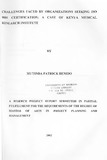| dc.description.abstract | Management of quality is a paramount in all organizations. The ISO 9001 standard defines a management system framework which includes the necessary and sufficient elements for the systematic management of quality. A review of literature revealed a major gap in research in the area of quality management system. Information garnered from this study will lead to knowledge transfer and could be used to reduce the severity of challenges encountered during QMS implementation and consequently lead to acquisition of ISO 9001 certification.
The researcher used mixed methods approach to draw from the strengths and minimize the weaknesses of quantitative and qualitative research approaches. A two-stage sampling procedure was used. The sample size comprised 110 employees out of the 550 KEMRI employees which represent a sample size of 20 percent of the total population. A tool kit containing a self administered questionnaire and structured in-depth interview guide was used.
The findings of this study summarize the results from the questionnaires and in-depth interviews. This study ascertained that Kenya Medical institute in its pursuit to acquire ISO 9001 certification encountered key challenges namely lack of commitment by management, inadequate human and financial resources, massive documentation requirements and negative organizational culture.
The study also established other challenges that the organizations was facing in its quest to get ISO certification such as high cost of hiring consultants, complexity of process, lack of understanding of ISO requirements, large size of the organization, inadequate training of staff on QMS, lack of technical knowledge and ineffective internal communication, low quality awareness and low level involvement of top management and employees.
Conclusion drawn from the findings of the study was that it was imperative for top management to commit itself to adoption of Quality Management System within an organization as this would play an integral role in its overall outcome. Any organization seeking to implement ISO 9001 QMS must be aware of the costs involved in both implementation and maintenance aspects of the system but also it is important to quantify the expected benefits. Development of a good organizational culture is a fundamental pre-requisite to the achievement of quality.
The ISO 9001 standard is highly documentation-driven and requires that all documentation be_ updated to reflect all its system requirements. The study confirmed that ISO certification process is dependent on the nature of the organization. Size of an organization, interaction of processes and structure of the organization should be factored when planning and executing a QMS. | en_US |

